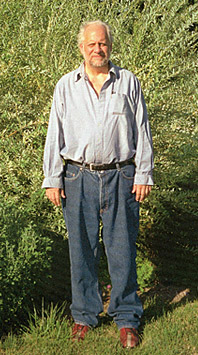Turning Over the Political Soil
Recent history books such as ‘Founding Gardeners’ by Andrea Wulf have revealed the botanical, horticultural and agricultural enthusiasms of the Founding Fathers and signatories to the Declaration of Independence, who recognized the most valuable assets of the colonies were diverse economic plants. In time, their experiments became passions. For Washington, Madison and Jefferson they became also metaphors for democracy. Most of the creators of our Constitution were keen gardeners—no “Golf Summit” for them!
Before and after the American Revolution, European immigrants feasted on the sheer volume of light, space and soil to cultivate. I imagine the impoverished peasants from dark and crowded lands hallucinating after discovering one long, vast, richly fed river valley after another, gleaming in the sun. Part of Northeastern Pennsylvania was called “The Endless Mountains”. Folks quipped that a squirrel could scamper from Appalachia to the Atlantic and never touch the ground.
The aptly labeled New World was fresh, clean and sparsely populated. Virtues, as well as crops, flourished here, free of the “dead hand” of history and stale traditions. The hardest, riskiest work was done by thousands of families of small scale farmers: people renowned for simple virtues.
Today’s political life in the US –and on Independence Day no less – is fraught with Biblical allusions, much as it was in 1776. But wearing religion on one’s sleeve is not a virtue. The Founding Fathers did not talk it; they walked it or, more precisely, rolled up their sleeves and “grew” it. The essence of virtue is evident truth, such as that revealed in a harvest or the promise of a seed, to paraphrase Henry David Thoreau. God was behind the scenes, not center stage. Our nation was a Creation myth.
The seeds that sowed the American Revolution were embedded in a peasantry from whom most of us descend. Like the farmers and gardeners then, those of today face a new burden—not only of fertility, weather and labor, but also of reinvention. We are cut off, abstracted from the natural world. We must not only reconnect but also recreate. Call ours a Recreation Myth.
What do we do with ourselves as we age, staring at the future? Our ancestors discerned reality in a tapestry of meadows, streams, and mountains; we flip through our remotes and retreat to Facebook. We must revolt against ourselves.
No longer fresh or clean, America remains fertile and vast. Time outdoors working the soil, sowing the seed, cultivating a “weather eye”: these should be the new technologies of the 21st century. The Revolutionary Era is the avant-garde.
We may never solve the puzzles of global economics or “foreign entanglements”, in the words of Gardener-In-Chief, George Washington. However, we can reconstitute ourselves as a people by heeding the example of 1776’s Greatest Gardening Generation.

Yes, our founding fathers lived out their religion. That is true. But, they also were not ashamed to talk about God and their religion. They did not deem it ‘politically correct’ to leave the mention of God’s name out of the Declaration of Independence, the Constitution, and many other important government documents. They lived out their religion in many ways, one of them being the name of God was included in everything that is important in the history of our United States.
Thank you, Leesa. Happy gardening and God bless you.
A great article and right to the point!
Thanks, Pat.
I just love your articles! As a midwestern farmer you seem to me to have so much common sense. Unfortunately in this day and age the weather and markets are no longer the only problems but the ignorance of people who make our laws, who are so far removed from the realities of growing food for not only this country but the world are threatening our way of life. We always struggle to grow food not only affordably but to maintain the land, we’ve owned for generations, for future generations. Not unlike our ancesters. Thanks for reminding us of our roots.
Thank you very much, Connie. Happy gardening.
Seems to me turning over the political soil would get you arm deep in manure.
Thanks for posting. I am not sure why you think so. Manure is only one component of a decent growing medium.
Hear! Hear! Bully for you! And Happy Fourth from Clinton, LA.
Thanks, Ann.
What a beautiful,thoughtful and thought provoking essay. Thank you!
Thank you, Janet.
I love your message on the Fourth Of July!
Thank you. Happy Gardening!
Let’s not forget the people who were here before most of our ancestors, the people who knew how to work the land and not over farm or overpopulate.
Thanks, Eric
What a great way to celebrate Independence Day! Digging in the fertile soil and remembering the ones that made it all possible. God is certainly behind the scenes in my garden!
We generate wealth the old fashioned way. In the final analysis, we get it out of the ground.
Thanks, Eric; totally agree.
I tink that perhaps your position is bit extreme but it is certainly well-taken. The problem is to et the “love of the land” to children, particularly in the cities. My garden club, in rural VT runs programs for elementary level school children and gives a $2000 a year scholarship to a highschool graduating senior who is continuing in horticulture, environmental sciences or foresry. We are having a hard time finding interested students these last couple of years! I guess they also need to be instilled with an understanding of the rewards of hard, physical work!
Sorry if I pushed it too hard, Margery. What was a bit extreme? I think we are on the same page. I do have often to write in a rather dramatic fashion in order to get published in newspapers. Thank you very much for posting, and happy gardening!